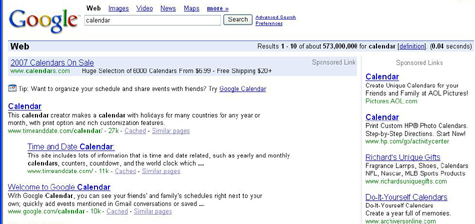Does Google play fair?

Matt Cutts offers his employer, Google, tips on how to improve its Google “tips,” while rallying support for Google.
Google “tips” are Google promos for its own products and services that appear at the top of Google SERPs, before the “organic” search result listings.
For example, searchers typing in “calendar” at the Google search box, perhaps aiming to buy a 2007 calendar, are returned a SERP which features a promo for Google’s own calendar product at the top of the search results:
Tip: Want to organize your schedule and share events with friends? Try Google Calendar

Google’s self-dealing “tips” are not speciifically disclaimed as house promotions.
Google’s house “Sponsored Links” for its own products and services are disclaimed, but may skew Google’s blind to Google advertisers AdWords auctions in Google’s own favor, as I dissect in “Google: Multi-billion dollar self-dealer?”
Regarding Google “tips,” Cutts presents his own Q & A to address the question of “fairness,” fairness towards Google, that is!
Q: Is it fair that people hold Google to a higher bar than anyone else in the search industry?
A: Whether it’s fair or not, it’s a fact that people expect more from Google than other companies. People compare other search engines to Google, but people compare Google to perfection. We have such passionate users that they’ll complain loudly if they think Google is ever straying from the right path. If you’re a Googler, it may feel frustrating. Instead, I’d choose to be grateful, because that passionate feedback keeps our heads on straight. When our users yell at Google, they care and want us to do the right thing (for their idea of what the right thing is). What other company gets that kind of feedback?
Cutts seeks to present an image of balance and objectivity, seemingly calling his employer, the most powerful search engine in the world, to task:
So yes, if the decision were up to me, I’d remove these tips or scale them way back by making sure that they are very relevant and targeted.
Cutts “admonishes” Google for its self-promotional “tips” algorithm not meeting the Google AdWords “standard” of “relevant” and “targeted,” using his own personal searches as negative examples. The personal searches Cutts cites are quite industry-specific and precise, however; They do not seem to be representative of typical one and two word generic search queries entered by average users.
Cutts’ Q & A attempts to finesse concerns over Google “tips” by enveloping the issue within a “people expect more from Google” stirring argument.
Cutts is correct in noting that people are “passionate” about Google, but the passion does not spur “feedback” because “they care and want us to do the right thing,” as Cutts asserts.
Cutts says "People compare other search engines to Google, but people compare Google to perfection."
By pointing out Google’s lack of transparency in its self-dealings, “people” are NOT comparing Google to perfection, they are seeking a level playing field from a $142 billion market cap worldwide corporation profiting from a 50%+ search market share.
ALSO: "Can Google organize ‘world’s information’?" and "Scoring Google on quality" and "Google 2007: More Googlers blogging?"